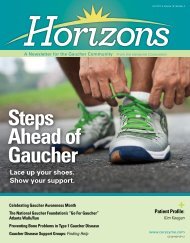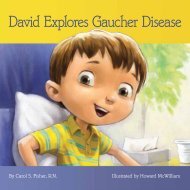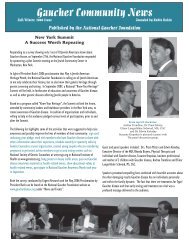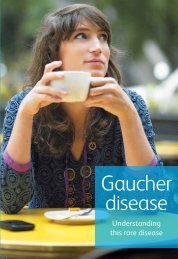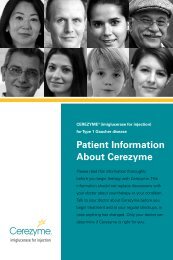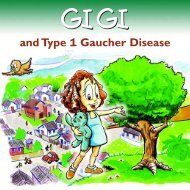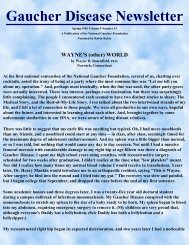Horizons Issue 3 2011 - National Gaucher Foundation
Horizons Issue 3 2011 - National Gaucher Foundation
Horizons Issue 3 2011 - National Gaucher Foundation
You also want an ePaper? Increase the reach of your titles
YUMPU automatically turns print PDFs into web optimized ePapers that Google loves.
In Your Corner<br />
Patient Education Liaisons and Genetic Counselors<br />
By Nick Sambides Jr. and Cheryl Alkon<br />
M<br />
any illnesses carry genetic components that get<br />
passed among families, within marriages, and<br />
down through generations. <strong>Gaucher</strong> disease type<br />
1 has so many genetic variables that Genzyme Corporation<br />
employs Certified Genetic Counselors and Patient Education<br />
Liaisons – people employed to explain just what those<br />
genetic elements are and who, within the families of disease<br />
sufferers, might have to contend with them.<br />
It’s a job with many challenges and satisfactions, said<br />
Lisa Sniderman King, a senior Patient Education Liaison and<br />
Certified Genetic Counselor at Genzyme.<br />
“Type 1 <strong>Gaucher</strong> disease is a relentless progressive condition.<br />
Bodies change, especially as people age or grow physically or gain<br />
weight, and you really need to ensure that the dose of medicine<br />
they [patients] are getting is appropriate,” Sniderman King said.<br />
According to Sniderman King, Genetic Counselors and Patient<br />
Education Liaisons don’t make those types of decisions, but will<br />
encourage patients to adhere to their providers’ recommendations.<br />
“What we do is not based on whether the patients get our<br />
treatment,” said Paula Ciampa, a regional manager of Patient<br />
Education Liaisons (PELs). She oversees several geographic<br />
regions in the US. “We do this because we have the knowledge<br />
and we want them to get the best care. This isn’t about ‘you have<br />
to be on Genzyme’s treatment.’ This is about ‘how to make the<br />
best decision about your care.’”<br />
Decisions, Decisions<br />
The decisions that need to be made by patients with <strong>Gaucher</strong><br />
disease type 1 depend largely on the individual and are often more<br />
varied than the genetic components themselves, according to<br />
Debbie Sullivan, one of Genzyme’s four Patient Education Liaisons<br />
and Genetic Counselors in the United States.<br />
Sullivan was recently working with the family of a 50-something<br />
patient with <strong>Gaucher</strong> disease type 1, whose daughter was about<br />
to marry. The family’s questions: Did the daughter have the illness<br />
Would she suffer the chronic fatigue her mother has to battle<br />
Would her children inherit the disorder Would they be carriers<br />
“Our job,” Sniderman King said, “is to help educate families<br />
so they know who is at risk and to understand who could benefit<br />
from testing.”<br />
In the case of the woman and her engaged daughter, Sullivan<br />
said she found that the daughter did not have the illness, but was<br />
a carrier, and that the chances of her children having the disease<br />
were almost nonexistent.<br />
All in the Family<br />
The genetic permutations of the disease can be tricky, Sniderman<br />
King said.<br />
“You could have patients with severe anemia and bone<br />
involvement and patients in the same family that are practically<br />
asymptomatic,” Sniderman King said. “I know of two siblings that<br />
have the same genetic mutations. One was diagnosed as a child<br />
because of her symptoms — enlarged spleen and nosebleeds<br />
— and her older sister is monitored annually because she was<br />
checked and she has remained asymptomatic.”<br />
PELs are committed to helping the entire family deal with<br />
<strong>Gaucher</strong>. If a child is diagnosed early in life, for example, a PEL<br />
can help parents work with school officials so that their son or<br />
daughter won’t be penalized for frequent absences that might<br />
occur due to receiving treatment.<br />
“If we meet with parents and they say ‘the school doesn’t understand<br />
what is going on, why is the child missing days of school’<br />
the PEL can step in,” said Kathleen Delaney, the associate director<br />
of the PEL group. Sometimes a child with <strong>Gaucher</strong> might qualify for<br />
particular accommodations that ensure his or her education won’t be<br />
affected by medical care, such as assignments that can be done at<br />
home, if infusion therapy cannot be scheduled after the school day.<br />
A PEL can help navigate the school system so the family isn’t doing<br />
it all alone. The Patient Education Liaisons can say to the parents, “If<br />
you let me do this for you, you can go back to being a parent.”<br />
The PELs also intimately know the medical setting. “We have a<br />
general knowledge of the disease and know how to work through<br />
the whole system of a hospital,” said Delaney, “and can talk to<br />
healthcare providers. It makes a big difference to have those<br />
people on your team. The Patient Education Liaisons have a sensitivity<br />
to the people in the field, and they really get it.”<br />
The PELs are four Genetic Counselors, each representing 150<br />
to 250 active patients in their respective geographic regions, they<br />
typically meet with families individually to explain the genetic<br />
components of the illness. (They also handle three other rare,<br />
unrelated genetic conditions: Fabry disease, Pompe disease, and<br />
Mucopolysaccharidosis, or MPS I.) Sniderman King is based in<br />
Washington State, in Seattle; Sullivan, in New York City.<br />
Their task often involves being among the first to explain what<br />
a <strong>Gaucher</strong> disease type 1 diagnosis can mean, in very real terms,<br />
to those who have it, and to their families.<br />
“Because the symptoms can vary widely, even among siblings,<br />
there may be other family members who have it and don’t know<br />
it,” Sniderman King said, “so we can help them get care and<br />
facilitate testing if they want.”<br />
Every family reacts differently, Sullivan said.<br />
“Some are very interested in supporting family members<br />
with the disease and what they are going through. Others are<br />
Please see accompanying full Prescribing Information.<br />
Winter <strong>2011</strong>/2012 / <strong>Horizons</strong> 7



